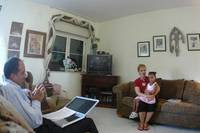By Sandra Jontz, Stars and Stripes
European edition, Monday, September 3, 2007 
Jo-Ann Reale is within days of having a new son.
She’s not pregnant. She and her husband, Lt. Cmdr. Thomas Reale, are adopting a son, Josiah, 3, from China.
It took a little digging for the Reales to find an adoption agency willing to work with a military family living overseas, said the soon-to-be-mother-of-five, who lives in Gaeta, Italy. “We kept hitting a brick wall. Finally, like, the sixth agency on our list was able to help.”
The Navy has embarked on an informational campaign to educate adoption agencies on the benefits of considering military families, even those living overseas, said Bruce Moody, a spokesman with Navy Installations Command.
“We’re looking to provide a portrait of a military family on a military base, primarily for the agencies who can’t see it’s like a little America,” Moody said. “We want to show them this is a great place to raise a family.”
He traveled to Naples, Italy, last week, taping interviews and snippets of daily life of military families who have adopted children.
Navy Fleet and Family Support Centers worldwide are providing more information for Navy families who want to adopt children, said Meg Falk, who is with the Community Alliance Branch of Navy Installations Command and responsible for coordinating Navy support through Fleet and Family Support Centers for parents wanting to adopt.
The centers can refer families to local support networks as well as inform them about state and international adoption agencies, she said.
On Sept. 17, the Navy launches a new adoption Web page on the Fleet and Family Support Program Web site that will provide a wide range of information, such as state and national agencies that can help and an 84-page, step-by-step guide through the complex process.
The National Military Family Association is also educating agencies on the merits of military families adopting children, said Jessica Perdew, deputy director of government relations.
Some adoption agencies reject military families for reasons including frequent military moves and requirements for lengthy residency or home ownership.
But more agencies have loosened restrictions after recognizing advantages of the military lifestyle, including medical care, special needs programs, and the military school system, Perdew said.
There might be disadvantages, especially with the nation involved in two wars and missions elsewhere. The association has linked up with the Rand Corp. to study the effects of deployments on children, Perdew said. “There is no really good data right now on how deployments might be affecting kids,” she said.
Monday, September 03, 2007
Navy touting merits of military-family adoptions
Posted by
Alex S
at
7:25 AM
![]()
Subscribe to:
Post Comments (Atom)


No comments:
Post a Comment